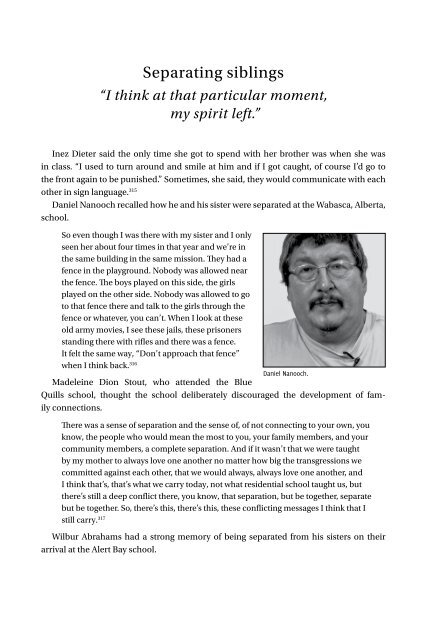The Survivors Speak
1MB8J05
1MB8J05
Create successful ePaper yourself
Turn your PDF publications into a flip-book with our unique Google optimized e-Paper software.
Separating siblings<br />
“I think at that particular moment,<br />
my spirit left.”<br />
Inez Dieter said the only time she got to spend with her brother was when she was<br />
in class. “I used to turn around and smile at him and if I got caught, of course I’d go to<br />
the front again to be punished.” Sometimes, she said, they would communicate with each<br />
other in sign language. 315<br />
Daniel Nanooch recalled how he and his sister were separated at the Wabasca, Alberta,<br />
school.<br />
So even though I was there with my sister and I only<br />
seen her about four times in that year and we’re in<br />
the same building in the same mission. <strong>The</strong>y had a<br />
fence in the playground. Nobody was allowed near<br />
the fence. <strong>The</strong> boys played on this side, the girls<br />
played on the other side. Nobody was allowed to go<br />
to that fence there and talk to the girls through the<br />
fence or whatever, you can’t. When I look at these<br />
old army movies, I see these jails, these prisoners<br />
standing there with rifles and there was a fence.<br />
It felt the same way, “Don’t approach that fence”<br />
when I think back. 316<br />
Daniel Nanooch.<br />
Madeleine Dion Stout, who attended the Blue<br />
Quills school, thought the school deliberately discouraged the development of family<br />
connections.<br />
<strong>The</strong>re was a sense of separation and the sense of, of not connecting to your own, you<br />
know, the people who would mean the most to you, your family members, and your<br />
community members, a complete separation. And if it wasn’t that we were taught<br />
by my mother to always love one another no matter how big the transgressions we<br />
committed against each other, that we would always, always love one another, and<br />
I think that’s, that’s what we carry today, not what residential school taught us, but<br />
there’s still a deep conflict there, you know, that separation, but be together, separate<br />
but be together. So, there’s this, there’s this, these conflicting messages I think that I<br />
still carry. 317<br />
Wilbur Abrahams had a strong memory of being separated from his sisters on their<br />
arrival at the Alert Bay school.


